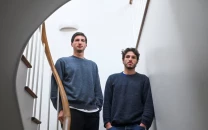Project to harvest rain for long drawn out summer

Project to harvest rain for long drawn out summer
But the water he had collected from a nearby filtration plant had run out, and there wasn’t even enough to wash his face. The 28-year-old video producer was getting late for work, so he did the next best thing he could think of. He rushed to a relative’s house in Rawalpindi for a quick shower.
“I’ve been going through this for more than a month now,” he said, shaking his head in exasperation.
Residents of Islamabad have been complaining of acute water shortage for the past few months now. During the pilot launch of a rain water harvesting project on Monday, the chairman of the Capital Development Authority (CDA) admitted the problem and attributed it to a lack of proper planning for storing rain water.
“Islamabad has a huge potential to benefit from this concept and overcome water shortage,” Imtiaz Inayat Elahi said, while inaugurating the project at the compound of Faisal Mosque.
Addressing the same ceremony, the Secretary of Ministry of Science and Technology K. B. Rind said the ministry was also working on projects for storing rain water, as the “underground water level was going down, which would create a negative impact on future generations.” But there are fears that a plan that relies solely on rain water could have adverse consequences in the face of a dry weather spell.
Shahid Sohail, who designed the Water Conservation and Drought Contingency Plan (WCDCP), and is also CDA’s Director Sewerage Treatment Plant, brushed off these fears. “We are expecting pre-monsoon rains by the end of June and monsoon rains in July.” He added that when the city was going through a dry spell a few months ago, the water conservation plan was followed, which helped “overcome the water shortage in the capital.”
He also went on to say that at the moment, there was no shortage in the capital city. “There is enough water in the reservoirs to cater to the need of residents of the capital,” he said. Chaudhry Abdul Malik, a senior official of National Assembly, who lives in Sector G-8, disagreed. “I have been going through water shortage for the past four months now. I’ve complained to CDA many times but the issue has not been addressed.”Others, however, like Gul-i- Atif, a 50-year-old doctor, who lives in Sector I-8, said she had not faced any water shortage problems.
The rain water harvesting project that kicked off on Monday is a result of a collaboration with the United Nations Development Programme and Pakistan Council of Research for Water Resources (PCRWR) at a cost of Rs1.5 million, according to Shahid Sohail.
The aim of the project is to “recharge” the underground water table to avoid shortage in the future. At the inauguration, chairman Inayat Elahi said, “The CDA has made comprehensive arrangements to replicate this network across the federal capital to benefit from this primary source of water.”
He said the authority had envisaged several projects including introduction of roof-top water collection system at old Naval Headquarters building, conducting preparatory work for a rain harvesting system in different city parks and penalties against those involved in water wastage.
He also added that an amendment had been made in CDA Building by-laws that made it mandatory to construct a roof top water collection system in houses built on plots of 400 square yards or more.



















COMMENTS
Comments are moderated and generally will be posted if they are on-topic and not abusive.
For more information, please see our Comments FAQ